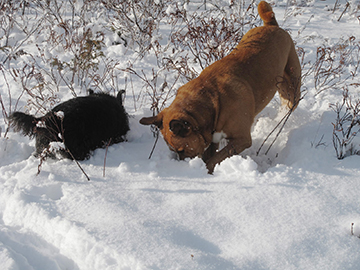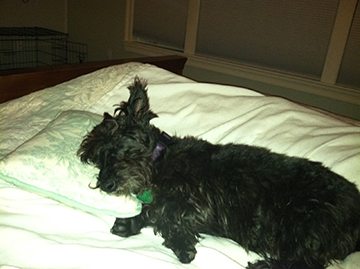Do you ever wonder why your dog performs certain behaviors or motor patterns? I sure have! For example: Why does my dog roll on smelly things? Why does my dog shake his toy? Should I be worried if my dog stalks his playmate? Why does my dog guard his bones?

When we think of our dogs behaviors we can summarize that all their behaviors come from three simple motivations:
1. Hunting/obtaining food
2. Safety/avoidance seeking
3. Sexual/reproductive behaviors
Behaviors observed in just the hunting motivations: orient to sound or moving object, stare, freeze, creep, stalk, run, jump, grab, hold, shake, hold down, kill, eat, guard.
Can we change phylogenetic behaviors? All behaviors can be modified to some degree with patience and a strong counter conditioning process.
Inherently genetic behaviors may be strong in your dog and low in my dog, as each dog has a different genetic make up. Such as rolling in feces, a yucky behavior to us humans, but many of our dogs do it! Why? The science behind this behavior is that our dogs roll in animal feces or on a dead animal so they can mask their scent to better help them sneak up on their prey. Does your dog need to stalk his prey for survival? Unlikely, but this behavior can be a strong genetic trait.

We know some dogs learn to play fetch just by watching another dog play fetch. This is called Social Learning. Other dogs perform behaviors for the reward, for example my female Scottie will frequent my neighbors back yard and scan for a squirrel to come down the bird feeder. She has been successful on two occasions and enjoyed eating them as well. Does she need to hunt for survival? No, but this behavior is both rewarding to her, and a strong genetic trait, therefore she will repeat it.
Many dogs use hunting behavior patterns in play, others will use sexual motor patterns like mounting and neck biting to initiate play. The point is our dogs do many behavior patterns as a result of their genetic make up. If this behavior is followed by a reward, then this behavior will most likely continue to be practiced.

